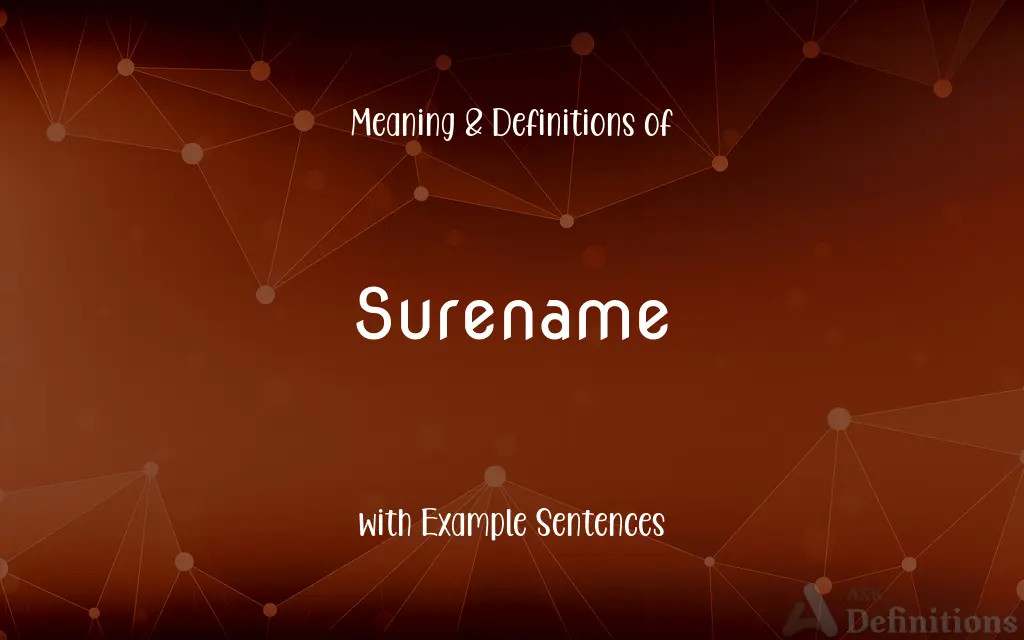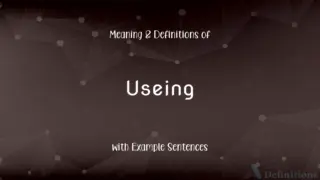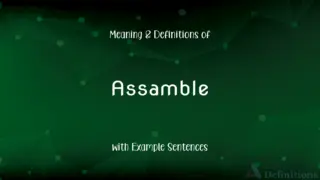Surename Meaning and Definition
"Surename" is not a standard word in the English language. Please consider the correct spelling, "Surname." Misspellings can create confusion or diminish the perceived quality of the text.

Table of Contents
Surname Definitions
Surname refers to a family name passed down from one generation to another, typically used with a given name to identify a person.
Her surname, Johnson, was a common name in that region.
A name shared by members of a family, as distinguished from each member's given name.
The surname Smith is often associated with blacksmiths in historical records.
The part of a person's name indicating family lineage.
In many cultures, children inherit their father's surname.
A name indicating one’s ancestors or lineage.
His surname was of noble origin, tracing back to medieval knights.
In some cultures, a name signifying profession, locality, or other family characteristic.
The surname Baker historically indicated the profession of one's ancestors.
A paternal name passed from father to children in many traditions.
In many cultures, it is traditional for the wife to adopt her husband's surname.
A last name used for formal identification.
On official documents, your surname appears after your first name.
An inherited name common to all family members.
Changing one's surname can be common upon marriage in many societies.
A name added to a person’s given name to identify familial or clan affiliations.
In Scotland, surnames often identify a person's clan.
The legal name under which a person is registered at birth, marriage, etc.
She decided to hyphenate her surname after getting married.
The family name as opposed to the personal, or given, name.
When filling out forms, your surname should be written in the last name field.
A name shared in common to identify the members of a family, as distinguished from each member's given name. Also called family name, last name.
A nickname or epithet added to a person's name.
To give a surname to.
(obsolete) An additional name, particularly those derived from a birthplace, quality, or achievement; an epithet.
(obsolete) An additional name given to a person, place, or thing; a byname or nickname.
The name a person shares with other members of that person's family, distinguished from that person's given name or names; a family name.
James is my first name, and Smith is my surname.
(Classical studies) The cognomen of Roman names.
A clan.
(transitive) To give a surname to.
(transitive) To call by a surname.
A name or appellation which is added to, or over and above, the baptismal or Christian name, and becomes a family name.
An appellation added to the original name; an agnomen.
To name or call by an appellation added to the original name; to give a surname to.
Another shall subscribe with his hand unto the Lord, and surname himself by the name of Israel.
And Simon he surnamed Peter.
The name used to identify the members of a family (as distinguished from each member's given name)
Surname Snonyms
Patronymic
A name derived from the name of a father or ancestor.
Johnson is a patronymic surname meaning son of John.
Cognomen
In ancient Rome, the third name of a citizen, indicating their family group.
Caesar was a cognomen in the Julian family.
Matronymic
A name derived from the name of a mother or female ancestor.
In some cultures, matronymic surnames are used, though they are less common than patronymics.
Family name
The name carried by all members of a family.
Her family name was renowned in the area for their vineyard.
Lineage name
A name indicating a person’s lineage.
The lineage name was a matter of pride in their community.
Clan name
A name associated with a specific clan, especially in Gaelic or African cultures.
His clan name was associated with warriors in ancient times.
House name
A name associated with a particular family, especially in aristocratic or noble contexts.
The house name was respected throughout the region.
Last name
The name that appears at the end of a full personal name, typically used in formal contexts.
Please enter your last name in block letters on the form.
Ancestral name
A name reflecting the lineage from ancestors.
Her ancestral name was linked to a small town in Italy.
Hereditary name
A name passed down through generations.
The hereditary name carried the legacy of their forefathers.
Surname Example Sentences
Their surnames were different, but they were siblings, having chosen different names after their parents' separation.
The list was alphabetized by surname for easier reference.
Authors often use pseudonyms that differ from their surnames.
On the application, there was a separate field for the surname.
In many legal documents, the surname is of paramount importance.
She researched her surname to discover more about her ancestors.
She kept her maiden surname as her middle name after marriage.
The immigration process involved legally changing their surnames.
Her surname was mispronounced so often that she started using an Anglicized version.
His surname was unique, making it easy to trace his family's history.
The teacher called the students by their surnames to maintain formality.
Celebrities sometimes change their surnames for more appealing stage names.
The tradition in their family was to combine both parents' surnames for the children.
Surname analysis can offer fascinating insights into geographic origins and historical professions.
The etymology of his surname linked back to medieval England.
Common Curiosities
What is a stressed syllable in surname?
The stressed syllable in "surname" is the first syllable: sur-.
Why is it called a surname?
The term "surname" originates from the Middle English "surnom," which is a combination of "sur-" meaning "over, above" and "name." It refers to the name that is added on to one's given name, typically indicating family lineage or ancestry.
How do we divide surname into syllables?
Surname is divided into syllables as sur-name.
How many syllables are in surname?
Surname has two syllables.
What is the pronunciation of surname?
Surname is pronounced as /ˈsɜːr.neɪm/ or /ˈsɜːrnəm/, depending on the regional accent.
How is surname used in a sentence?
Surname is used to refer to a person's family or last name, e.g., Please enter your surname in the designated field on the form.
What is the verb form of surname?
Surname does not have a verb form; it is a noun referring to a person's family or last name.
What is the root word of surname?
The root of "surname" is from the Middle English "surnom," which itself comes from the Old French "surnom," combining "sur-" (over or above) and "nom" (name).
What is the singular form of surname?
The singular form is "surname," referring to one family name.
What is the opposite of surname?
The concept of an opposite of "surname" is not directly applicable. However, the term "given name" or "first name" refers to the part of a person's name that is not the surname.
Is surname an abstract noun?
No, surname is a concrete noun as it refers to a specific part of a person's name that can be identified and used in social and legal contexts.
Is surname a negative or positive word?
Surname is neutral; it does not inherently carry positive or negative connotations.
Is surname a vowel or consonant?
The word "surname" starts with a consonant.
Is surname a collective noun?
No, surname is not typically considered a collective noun. It refers to individual family names rather than a collection of items or people.
Is the surname term a metaphor?
The term "surname" itself is not a metaphor but a literal term referring to a person's family or last name.
Which determiner is used with surname?
Determiners such as "the," "your," "my," and "his/her" can be used with surname, depending on the context, e.g., "Please write down your surname."
What is the plural form of surname?
The plural form of surname is "surnames," referring to more than one family name.
Is the word “surname” a Direct object or an Indirect object?
Surname can serve as a direct object in a sentence, e.g., "She changed her surname after the marriage." It does not typically serve as an indirect object.
Which conjunction is used with surname?
Conjunctions like "and" or "or" can be used in sentences with "surname," depending on the overall structure, e.g., "Your first name and surname are required."
Is the word surname Gerund?
No, "surname" is not a gerund. Gerunds are verbs ending in -ing that function as nouns, and "surname" does not fit this description.
Which article is used with surname?
The definite article "the" or indefinite articles "a" or "an" can be used with "surname" depending on the context, though "the" is most common when referring to a specific surname.
What part of speech is surname?
Surname is a noun. It refers to a person's family name or last name.
What is another term for surname?
Another term for surname is "family name" or "last name," both of which refer to the part of a person's name that indicates family lineage.
Is surname a noun or adjective?
Surname is a noun. It refers to a person's family or last name.
Is surname an adverb?
No, surname is not an adverb.
Is surname a countable noun?
Yes, surname is a countable noun. You can have one surname or multiple surnames.
Is the word surname imperative?
No, "surname" is not imperative; it is a noun.
Which vowel is used before surname?
The choice of vowel before "surname" depends on the article or determiner preceding it, not on "surname" itself, which typically starts with a consonant sound.
Which preposition is used with surname?
Prepositions such as "of," "with," and "under" can be used with "surname," depending on the context of the sentence, e.g., "the surname of the author," "registered under a different surname."
Share Your Discovery

Previous Term
Inquery Meaning and Definition
Next Term
Buisy Meaning and Definition


























